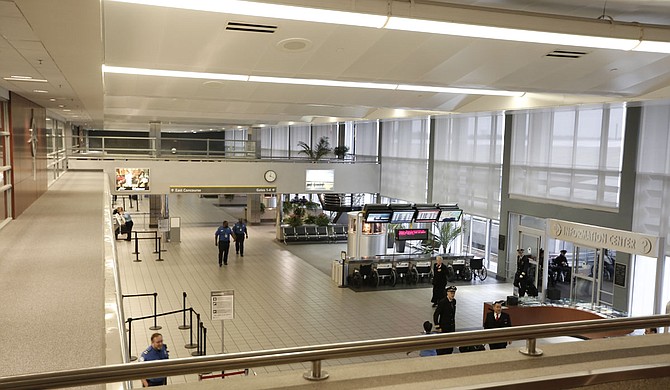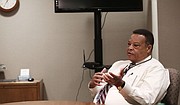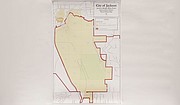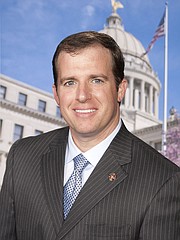Despite its small size, Jackson is the largest and busiest airport in Mississippi and smack dab in the middle of the state's population sweet spot—about a half million people live in the Jackson metro. Photo by Imani Khayyam.
In late January, a strange calm sets in at the Jackson-Medgar Wiley Evers International Airport.
Because most eastbound flights in and out of Jackson are cancelled due to a blizzard bearing down on the mid-Atlantic, the concourse is sparse at mid-day. Despite the biting cold and wind that's settled over central Mississippi, the challenges of Jackson's airport aren't often related to the weather.
Behind the scenes, administrators seem a bit frazzled as they maintain near-constant communication with rental-car companies to assess inventories for passengers who don't want to wait a day for a flight and nearby hotels to find enough beds for any passengers who might be stranded in Jackson overnight.
Jackson is nowhere near the top of any list of most-traveled U.S. terminals, but like Jackson itself, the airport fills an important funtion, as the kind of airport people pass through on their way to some of the nation's busiest concourses in cities such as Dallas, Houston, Atlanta, Charlotte, N.C., and Washington, D.C.
Despite its small size, Jackson is the largest and busiest airport in Mississippi and smack dab in the middle of the state's population sweet spot—about a half million people live in the Jackson metro. But the airport's untapped potential is one thing; who gets to do the tapping is another.
That's why the City of Jackson, which controls the 3,381 acres of land the airport occupies, is bracing for a looming battle for its control with the State of Mississippi.
'No Racist Connotation'
In early February, State Sen. Josh Harkins, R-Flowood, said he planned to file a bill to change who sits on the airport board. The bill, which had not been filed as of press time, is modified from Harkins' original proposal, which would have replaced the current five-member Jackson Municipal Airport Authority, or JMAA, with a seven-person board—two each from Hinds, Madison and Rankin counties, all appointed by the governor. Harkins says he plans to file his bill as soon as he gets it back from his attorney—likely sometime this week.
Harkins said he is letting the lieutenant governor's office look at it as well as the governor, whom he wanted to meet with about the bill before he filed it. Now, Harkins' tentative plan is to propose a nine-member board, also split between the counties and the City of Jackson, some combination of which the governor and lieutenant governor would appoint. The Jackson City Council would be able to submit three suggested members for the governor to pick from.
Harkins' bill also would require that at least one pilot serve on the board as well as the adjutant general of the Mississippi National Guard and the Mississippi Development Authority. He wants board members to have a wide area of expertise including members with aviation, business and engineering experience.
Harkins offered scant specifics on how the takeover would improve anything, but made it clear that he believes that more business people on the board, appointed by the governor, would make the airport more business-friendly.
In one of several interviews, Harkins said the airport is a huge economic-development driver that shuts out Rankin County because that county doesn't have a voice in operational decisions. A real-estate broker there who said he has no business interests the airport board could, Harkins said he said heard complaints from developers that the Jackson airport board has been difficult to work with over the years, leaving money on the table in terms of revenue.
When explaining his motivations for filing the bill, Harkins cites frequently repeated knocks on the airport: the high cost of flying out of Jackson compared to New Orleans or Memphis, the departure of Southwest Airlines in 2014, the lack of amenities inside the terminal and the dearth of development around the airport.
"I've been in (office) four years, and I have seen Southwest leave, and I haven't seen anybody from the airport up at the Legislature asking for us for help attracting another low-cost carrier. The fact that airline tickets are so high, it got me looking into it," Harkins told the Jackson Free Press.
"Some people want to make this a 'we're-taking-this-away-from-the-city-of-Jackson,' or there's even been suggestions that it's racist," Harkins added. "There's no racist connotation to what we're doing here. This is about making the airport the best it can be to serve the citizens of this state. Jackson, financially, will not suffer one bit under this plan. If the airport improves, the City of Jackson will improve. They'll get more revenue from it."
Harkins believes that a "regionalized" board will help drive more economic development of the area around the airport. "We should be trying to attract businesses that can utilize that airport and the space out there, and that's what I hope this new board will focus on and see what they can do," Harkins said.
The senator maintains that the current board is not doing anything wrong, and he said that Carl Newman is doing a great job. Harkins instead points to the need for more experience on the board as well as national trends toward regionalization in other airports across the country. He said that when the City of Jackson built the airport, there was not a lot of development in Rankin or Madison counties like there is now.
Harkins said he met briefly with Jackson Mayor Tony Yarber around the start of the legislative session to inform the mayor about the bill, which Yarber said then he would not support. Harkins also met with Newman in late 2015 as a courtesy to let the CEO know about his intentions for the board.
Said Harkins: "I think it's more of a regional asset, and it should be governed like that."
'Wonderful Financial Position'
Wearing a white shirt and maroon tie, Carl Newman speaks slowly and with authority about the weather and the storm of controversy now brewing around the airport.
"I think the impression people might have is the airport system is broken at this point. It is not. The airport is solvent. We are in a wonderful financial position," he told the Jackson Free Press.
Budget documents show that in fiscal year 2015, the airport generated $3.76 million in net income on total income of $16.2 million, with the largest expenses going toward employee-related costs of $7.8 million. In August 2015, the airport refinanced $25 million in bonds, which Newman said would save almost $4 million over the life of the loan.
The airport is an economic engine with a "multiplier effect" that helps employees, suppliers and other vendors, many of whom are Jackson residents, he says. In Newman's year-end review, which he presented to the airport board Jan. 6, he said 48 percent—$5.2 million—of all JMAA contracts were awarded to businesses based in the City of Jackson. In addition, Newman said $1.3 million, 9 percent, of the money the airport receives from the federal government went to Disadvantaged Business Enterprises, which includes minority-owned companies.
That's why the newly formed Business Ministerial Alliance of Mississippi spoke out against what they called a "hostile takeover" of the Jackson airport. On Jan. 15, the alliance chairman, Pastor Dwayne Pickett of New Jerusalem Church, argued that changing the governance of the airport would spur a major outcry from the city and its citizens.
"The citizens of this city are tired of being controlled by those that do not have their best interests at heart," Pickett said.
The alliance is willing to work with both sides on the issue, but Pickett was firm that a takeover of the airport may prove to be "catastrophic to the growth of the metropolitan area and its citizens."
Business and church leaders are concerned that a change in governance would make the City of Jackson more of an economic engine of the state rather than an economic engine for itself.
"We will not sit back and allow this to happen," Pickett said.
'Partners with Three Cities'
The JMAA hired Newman in early 2015 to replace longtime director Dirk Vanderleest. Newman, a certified pilot, came to Jackson after managing two top 10 airports, Phoenix Sky Harbor International and then Bush International in Houston.
In the business of airports, cooperation and sometimes tension between local government and the airport commission are common. In Phoenix, the city's airport borders Tempe and, therefore, Newman said discussions between those two cities were ongoing.
"I've not been involved with a situation in which we had one entity talking about taking over another. I think it's fair to say I did not expect to be walking into that," he said.
The airport, originally called Allen C. Thompson Field after the Jackson mayor at the time—the same mayor whose "Thompson Tank" was used against civil-rights protesters—has been in operation since 1963. The City always controlled the airport with two commissioners serving under the mayor, who appointed the airport authority.
The 1963 Jackson Municipal Airport Authority annual report says the airport authority was composed of five members with a chairman and vice chairman.
The more than 3,000 acres the airport sits on are critical to the JMAA's long-term plan. The Jackson airport is developing 700 acres of land along its eastern edge, which Newman said wasn't accessible until the airport started building a road to provide access to the land. One section was complete in 2013. With that piece in place, Newman hired former Jackson State University communications representative Jean Frazier to lead marketing of the parcels.
"What we have in mind is stuff that is compatible with aviation uses. We'll be seeking firms that manufacture aircrafts, firms that maintain aircraft, parts manufacturers. There's a term in our industry—MRO—maintenance, repair and overhaul," Newman told the Jackson Free Press.
"The key point was until that road went in, there was no access to (the land) to be developed. We're partners with three cities—Flowood, Pearl and Brandon—in getting this done."
Brad Rogers, Pearl's mayor, agrees that development has historically been difficult because of the lack of access points. Currently, Airport Road is the only public thoroughfare in or out of the airport. The new road should help with development in the region, even though none of it would take place in Pearl proper, Rogers said.
As far as the entity that controls the airport, Rogers believes that "some regionalization of the board would be a good thing."
"All the funding, all the money can stay in Jackson, but I think there needs to be input from the Rankin County Board (of Supervisors), the Madison board and the Hinds board," Rogers said.
The second phase of airport development will involve a second section of road from the south side of the airport; eventually, the plan is to have the road go all the way to Interstate 20. Newman said the airport is finalizing a strategic plan, which highlights the development, which has a lease option with Freedom Realty.
Ron Harvey Jr., a principal with the firm, told the Jackson Free Press that he was not ready to talk about the project.
"Most airport (representatives) realize they have to develop non-airline sources of revenue. This property and developing it gets us a long way down the road. It has the potential to add millions of dollars a year in revenue," Newman said.
The Southwest Connection
Before the Jackson airport can capitalize on that potential, it will have to overcome perceptions—both real and imagined—that flying from Jackson is more of a hassle than it is worth. For example, consider that a Delta flight from Jackson to Atlanta leaving on March 1 and returning one week later costs $389 with one month's notice. The same ticket to Atlanta costs $167 when leaving from New Orleans, information from the Delta website shows.
The loss of Southwest in 2014, regarded as a lower-cost carrier, only added to frustrations even if Southwest's decision to leave had nothing to do with the management of the Jackson airport. A Wall Street Journal analysis of industry and government data in September 2015 found that airport carriers have cut flights and raised fares at many smaller and medium-sized airports.
The Journal said this shift is due to large airline mergers as well as airlines moving their business where they can make the most money—in larger markets, not smaller ones. The Journal found that several airlines made their deepest cuts at smaller hubs; for instance, Delta eliminated Memphis as a hub after it merged with Northwest Airlines.
Newman said even though Southwest left the market, he has met with representatives of the airline since coming to Jackson.
"If you look at what's going on with Southwest, previously they shied away from big, expensive airports. If they had a choice between operating out of Oakland or San Francisco, they operated out of Oakland. If they had a choice between operating out of BWI (Baltimore) or Reagan or Dulles, they operated out of BWI—places that are a little bit off the beaten path," he said.
"Now, the focus has changed. They're going into larger places. They've also made a business decision to go into the international (market), so they're executing on that right now," Newman added.
Then, in October 2014, a federal law called the Wright Amendment, which regulated traffic at Love Field in Dallas, expired. The law, passed in 1979, required flights into Love to make a stop right outside of Texas to curb what was then heavy traffic, which made cities like Jackson more attractive to the airline.
"Airlines try to get into the high 80-percent range and, if they can, get into the 90-percent range," Newman said.
"To make the matter worse, Southwest is a point-to-point flyer ... the seats (with people in them) on those flights were being filled in other places."
Feds to the Rescue?
In Sen. Harkins' view, the Jackson airport could benefit from regionalization. He points to the Golden Triangle Airport in northeast Mississippi as well as regionalization attempts in Syracuse, N.Y., and Charlotte, N.C. In 2013, the Republican-controlled North Carolina General Assembly passed a bill to take oversight of the Charlotte Douglas International Airport from the majority-Democratic Charlotte City Council and give it to an 11-member commission. Charlotte countered with a lawsuit in state court, which resulted in an injunction that left the airport in Charlotte's hands.
Between 2013 and October 2014, legal fees related to the lawsuit topped $1 million, The Charlotte Observer reported.
Charlotte also asked the Federal Aviation Administration to intercede, but the agency—which is headed by former Charlotte Mayor Anthony Foxx, who recused himself from the issue—said it would not weigh in until the court battles are resolved.
The Charlotte Business Journal reported that the state's new law required the current city aviation director to become the chairman of the new commission, but after the injunction, the director had only a small role to play—although he still collected his state-sponsored paycheck each year.
Jackson legislators have made it clear that they are not interested in the state intervening.
Sen. John Horhn, D-Jackson, believes that the dispute could hinge on the outcome of the national presidential election. "Ultimately, the decision will be up to the Federal Aviation Administration, who has to approve governance changes," Horhn said.
Horhn, who has chaired the Senate Economic Development Committee since 2012 and will continue to this session, said the FAA does not allow airport income to go to state governments; most airports are either municipally or regionally operated.
Jeffrey Price, an aeronautics professor at the Metropolitan State University of Denver, said the FAA primarily cares about two things: first, "aeronautical activities," meaning that an airport is actually worried about airplane operations and; second, that an airport spends all of its FAA money on airport-only expenses. How airports spend FAA grant dollars are typically at the heart of complaints to the FAA called Part 16s, which refers to a provision in federal airport compliance rules, Price said.
"It's like sending your kid to college and paying for it as long as they're staying out of trouble," Price, who has worked in aviation for 30 years, said. "The FAA says we'll give you money, and you agree to run the airport a certain way."
When an airport agrees to take FAA grant funding, it must comply with the grant assurances for 20 years. If a Part 16 complaint is found to be valid, an airport risks losing all its federal funding, a move that would shut down most airports.
Beyond spending federal dollars correctly, however, Price says that the FAA prefers to stay out of most governance matters with its airports. A city, county or a port authority—and rarely—a state can run an airport. A city or county runs 60 percent to 70 percent of airports, Price estimates, and an independent airport authority—often formed as its own entity with the sole purpose of operating the airport—runs the rest.
"I understand where they're going with it. What's unusual about it is the governor controlling all of those appointments," Price said of Harkins' plan.
If a multi-county commission exists, it usually gets to appoint its own members to represent its constituents. Price did serve on the Colorado Aeronautics Board 10 years ago—a position he said the governor appointed—but that board did not oversee a single airport. Instead, it oversaw all aviation in the state of Colorado.
Price said the FAA prefers to stay out of governance issues with its airports, and disputes with tenants or airlines are usually not worthy of a successful complaint. "The FAA does not want to come in and manage your airport or come in and clean up your mess," he said. "They will do everything they can to stay away from it."
Combining Forces
Reminiscent of Gov. Haley Barbour's ultimately unsuccessful suggestion a few years ago to consolidate the state's historically black colleges, the airport controversy has come to represent a microcosm of Mississippi race politics and power.
Harkins said his bill would not "de-annex" the land Jackson bought from Rankin County in the early 1960s and annexed into the city. As part of that deal, Jackson agreed not to expand eastward beyond the Pearl River without getting permission from the Rankin County Board of Supervisors.
Even though the legislation would put new governing authorities in place over airport operations, Harkins said his bill does not change the airport's name and that he would not be in favor of doing so. The namesake of the airport—the martyred Jackson civil rights leader—has rankled some conservatives since 2011. Resisting the airport takeover is one of the items on the City of Jackson's legislative agenda this year. The Hinds County Board of Supervisors has also pledged to lobby against Harkins' bill.
Pieter Teeuwissen, the attorney for the Hinds County Board of Supervisors, said resisting the changing is important because what's good for Jackson is good for Hinds County. "The people who want control of the airport had control of the airport. They moved. You can't move out of the city because wanted better schools and lower crime and then want to take all the good things with you," Teeuwissen told an audience at Koinonia Coffee House in late January.
Meanwhile, the JMAA hired Worth Thomas, the same lobbyist Jackson is using, to represent the airport's interests at the Capitol this session.
Jackson City Council President Melvin Priester Jr. said that when he joined the city council in 2013, people told him that the city should never give up two assets: its water rights from the Ross Barnett Reservoir and its control of the airport.
Priester wants to know how changing the composition of the airport will bring back Southwest or attract another carrier or how Harkins' plan will spur economic development or even improve public safety.
"This is not making the pie bigger; this is changing who has the pie," Priester said. "It's frustrating because we're being dripped information, and you look at what's been proposed, and it makes no sense."
Read Mayor Tony Yarber's response to the bill here.
Comment at www.jfp.ms/airport.






Comments
Use the comment form below to begin a discussion about this content.
comments powered by Disqus